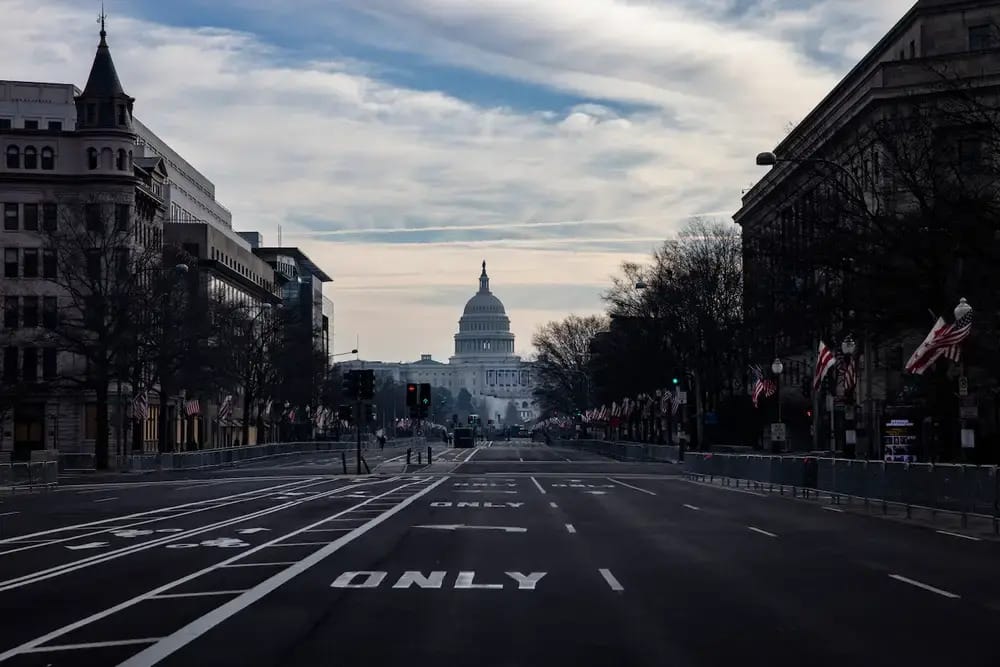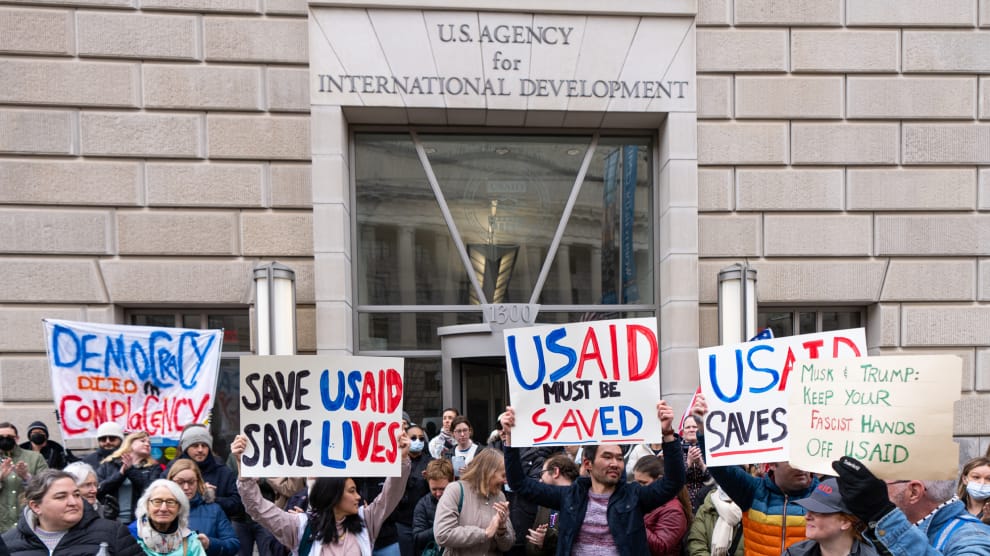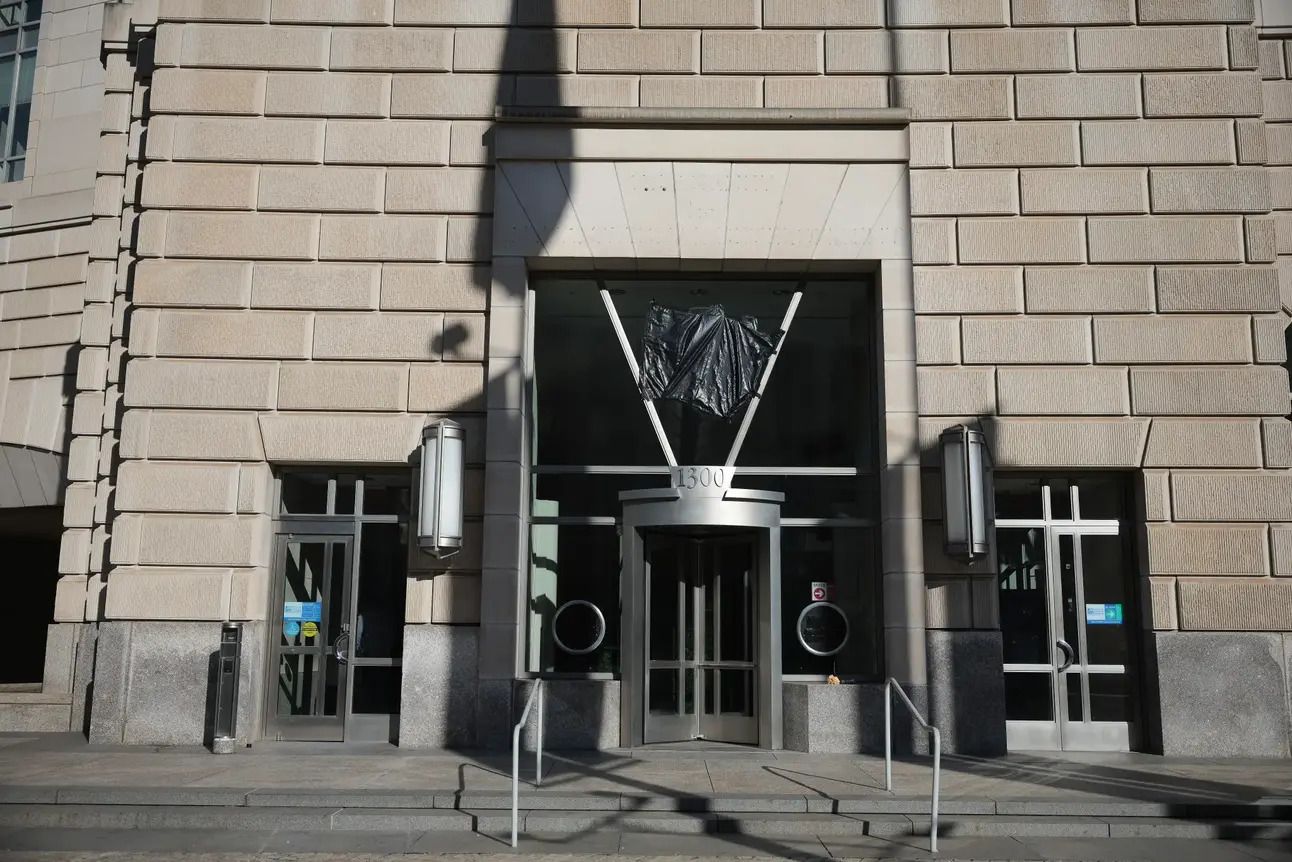
Demonstrators during a protest for the USAID on Capitol Hill in Washington, D.C. on Feb. 5. Credit: Bloomberg
On the very first day of the second Trump administration, foreign aid was put on a 90-day “pause” through an executive order, which was framed as an evaluation of the efficacy of the United States’ foreign aid programs. But here’s what it looked like for someone working in the field during those first weeks—and what it could mean for the industry in the long term.
Some Context About U.S. Foreign Aid…
In 2023, U.S. foreign aid totaled $71.9 billion, just 1.17% of the total budget that year ($6.1 trillion). Thousands of U.S. 501(c)(3) nonprofits receive foreign aid grants each year, executing programs approved by the Department of State or USAID related to foreign assistance. These grants are included in the federal budget approved by Congress. Once funds are allocated, organizations must request “drawdowns” based on quarterly expenses. Funds are then deposited into the grantee’s operating account to be spent as outlined in the grant.
January: The Shock and Scramble

Protests occur near the White House in Washington, D.C. in early February. Credit: Boston Globe
The executive order went public on January 20—the day Trump took office. Organizations funded by foreign aid grants scrambled to understand the new directive and its impact. A crucial part of the “stop work” message grantees received was that they were to “incur no more costs.” As any business owner knows, stopping all business-related spending is easier said than done. There are salaries, rent, and taxes to pay.
My employer—a nonprofit almost entirely funded by foreign aid grants—was directly affected. A call went out to the team informing us of the changes and the executives’ thoughts on how this would impact our work. But no one had any clear answers. The Office of Management and Budget (OMB) offered no clarification on how to comply with the order. State Department and USAID staff were prohibited from discussing it in detail, and some organizations were told, “No further guidance is forthcoming.”
We soon learned that most of our 35 staff members would be terminated by the end of the week. The unprecedented nature of the order meant organizations were unsure whether they could retain staff during the suspension. The “incur no more costs” rule was the main issue. Even though the funds had already been allocated, grantees couldn’t request drawdowns to pay staff.
Those familiar with the standard practice of administering foreign aid were unsure how to proceed given the unprecedented nature of the order. The regulations that govern how federal grant funds may be used, known in the sector as 2 CFR 200, only loosely outline how funds can or cannot be used in the case of a temporary suspension. One section, §200.343, states that costs may be incurred “if the Federal award was not suspended or expired normally.” The regulations that will be enforced regarding spending during the 90-day period are still up for debate.
February: The Uncertainty and Tension in D.C.

Pennsylvania Avenue in Washington, D.C. Credit: The Washington Post
In D.C., it felt like walking on eggshells. Those fortunate enough to still have jobs in foreign aid were preparing for the worst, hoping for the best. Those who had been laid off were relying on resume reviews and referrals. The big question on everyone’s mind was not only what this would mean for D.C. as a city, but as a community. No one had any answers.
The freeze wasn’t just a bureaucratic headache—it was a direct threat to the livelihoods of those who worked in the foreign aid sector. With agencies in disarray and nonprofits in limbo, the city’s pulse seemed to slow. For many, the question wasn’t just about the future of their careers, but about how this disruption would reshape the very fabric of D.C.’s professional community. The city had long been a hub for public service and diplomacy, but now, with thousands of jobs on the line, the sense of security that once defined D.C.'s political ecosystem felt fragile at best. The fear was not just of layoffs, but of what a crumbling foreign aid system would mean for the city’s economy and reputation.
Even though foreign aid is approximately 1% of the federal budget, there are thousands of grants for programs yearly. The Executive Order states that “reviews of each foreign assistance program shall be ordered.” It remains to be seen who is responsible for enacting those reviews as the Department of State and USAID - the two main bodies involved in granting and monitoring foreign aid programs. Given that Trump and DOGE have all but gutted USAID and the State Department, it seems unlikely that an efficient and accurate review of thousands of foreign aid programs will be accomplished during the 90-day period.
Mid-February: The Growing Crisis

Employees and supporters of the USAID protest outside its Washington, D.C. headquarters Monday. Credit: Getty Images
In a year where a week has felt like a month, a 90-day pause for most programs could create even larger problems than it already has. Terminated contracts, leases, and mass layoffs have their own cost as well. Breaking a lease can cost thousands and many organizations aren’t sure how their lease can be paid if they cannot draw down funds from their grant allocation. While the order may be called a “pause” by the Trump regime, it will come at the cost of untold thousands of jobs and the sharpest decline in U.S. soft power in modern history.
For an administration that seems hell-bent on maximizing government efficiency and reducing waste in the name of “national security,” these cuts came out of nowhere and blindsided tenured government employees and sector leaders. US foreign aid is one of the greatest soft power assets that the government has. Interestingly, Elon Musk has experience with foreign aid given that his home country of South Africa was the beneficiary of many HIV/AIDS prevention programs and post-apartheid rebuilding.
Millions of people rely on foreign aid for jobs, resources, medicines, and life-saving programs to survive. Ripping away a crucial part of US influence abroad is idiotic and reactionary. Alliances are at risk, diseases will spread, and people have already died because of this decision. Even though a waiver was put out that exempts life-saving programs from the pause, some organizations like USAID Kenya that works with HIV/AIDS prevention are still unable to access allocated funds to continue programs.
What the Future Holds: A Long and Uncertain 90 Days

The Ronald Reagan Building in Washington, D.C., the former headquarters for USAID, sits vacant. Credit: New York Post
Imagine 90 days without a steady paycheck or without access to life-saving medications made possible by U.S. foreign aid. Imagine 90 days of unanswered questions and legal teams that can’t clarify your organization’s standing. For the nonprofit sector, which is known for adapting to constant change, this is a crisis that threatens to unravel years of work.
For an industry that stereotyped a new way every year, the nonprofit space is incredibly resilient. It is no shock that communities have already rallied together to help raise general operating expenses for causes they care about. Some organizations that handle government aid programs are not so lucky. The work is tedious, thankless, and underpaid in many cases.
As of the date of publishing, there is no public-facing strategy for how programs will be reviewed. No one knows if the pause will last longer than 90 days or if POTUS and his unelected immigrant billionaire sidekick will create some grand new plan.
The only thing that is for certain is that nonprofits and organizations dedicated to the betterment of society will close. There will be thousands of people out of a job which puts an unnecessary burden on the unemployment system. For those with employee-sponsored health insurance the outlook is even more dire. The job market is already competitive right now. An influx of dedicated, incredible people is going to make it even harder to find a position now.
A Final Word
This administration has never stepped foot in reality. They are rooted in some kind of authoritarian dream world where their wants and needs, and only their wants and needs are satisfied. Everyone else is told to pull themselves up by their bootstraps, just like Trump did when he inherited a real estate empire from his father — how relatable. They do not know what real work is. Don’t believe them when they say that gender-affirming care isn’t life-saving, or that USAID and the State Department are stealing millions. This is a time for action and resistance, not compliance.
Caroline McFall is a nonprofit operations specialist. She lives in the Washington, D.C. metropolitan area.
We welcome story submissions that offer unique insights, thought-provoking analysis, and bold perspectives on current events, culture, and politics. If you have a story idea, we’d love to hear from you!
Drop us a line: [email protected].